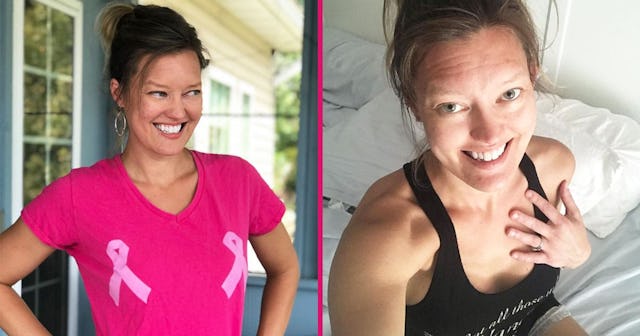What I Really Needed To Hear (And Not Hear) When I Had Breast Cancer

I was talking to a friend whose mom had a suspicious breast lump. My friend was adamant that if it were her, there’s no way she’d put toxic chemo in her body. She would opt to change her diet, do more yoga, and see what happened. The way she spoke, it was as if cancer was just a blip on the radar and not a life-altering event that could lead to death.
I didn’t know then that three years after our conversation, I’d be a breast cancer patient. I was 35 years old when I was diagnosed—and I never thought I’d be someone with cancer. Or if I did have cancer, I’d be old—not a mom of four with a writing career and a minivan.
I kept my diagnosis very private—mostly because I had a huge decision to make. Would I opt for a lumpectomy and six weeks of radiation, followed by a breast MRI every six months to check for reoccurrence? Or would I select the more drastic option—a bilateral mastectomy—and further reduce my risk of cancer returning? I didn’t want anyone to weigh in on my decision outside of my doctor, a few survivors I knew, and my spouse—the person I trust most.
I made the decision to have the bilateral mastectomy. A few weeks after my surgery, once my all-clear pathology report came back, I announced to my friends and family what I’d been through. I mistakenly thought that by announcing my cancer after-the-fact, I wouldn’t have to deal with any unsolicited advice or uneducated opinions.
I was wrong.
During my mastectomy recovery, I was incredibly weak. I could barely move my arms. I couldn’t get out of bed, go to the bathroom, take a shower, pull my hair in a top knot, or make myself a snack. I needed assistance for every little thing. I also couldn’t drive, dose my own medications, or even open the child-proof medication bottles. I’ve never been in so much pain or discomfort in my life.
Cancer wasn’t just a physical battle. The emotional and mental toll it takes on a woman stays long after her cancer cells are gone. I also had many long, curse-word-full talks with God that included many questions including, “Why me?”
In the midst of my brokenness, vulnerability, and weakness, I was met with considerable comfort. I had friends and family members bring my family meals for six solid weeks. I received numerous gifts, texts, cards, and surprise visits. It was beautiful.
But there were also those who couldn’t help but chime in—starting a conversation I never wanted to have. I was barely in a place where I could say the word “cancer,” let alone have a conversation with someone about how they were feeling about my disease.
One distant friend said to me, in an effort to be supportive of my choice to have a mastectomy, “I would have just had them cut off, too.” The mental image was incredibly disturbing. I could hardly even look at my new breasts when I stepped out of the shower—facing our huge over-vanity wall mirror–let alone discuss amputating my old ones in a major surgery. My new boobs were very round and very silicone.
I had someone else tell me, “Well, they are just boobs.” I guess I shouldn’t be a hot mess, because my boobs weren’t essential to living, right? But the truth is, they aren’t just boobs. Whether we like it or not, boobs can be tied to femininity. Boobs can feed babies. Boobs are for sexual pleasure. Boobs fills swimsuit tops and v-neck t-shirts.
Another person suggested that maybe I should have tried to do some natural cures instead of listening to big pharma sponsored doctors. Go to the chiropractor, stick to a vegan diet, and visit a certified healer she’d heard about on the radio. Sure, I thought, I bet a little CBD oil and some carrot sticks would magically dissipate my cancer cells.
Even messages of how strong I was during my ordeal were hurtful—because I didn’t want to be strong. I didn’t want to fight cancer. I didn’t want to be the one in the one-in-eight-women-will-get-breast-cancer-in-her-lifetime statistic. Being strong wasn’t even a choice, anyway. I could fall apart or pretend cancer didn’t exist, or I could have surgery. To me, facing surgery wasn’t even a choice. It was what I had to do.
I didn’t want pink ribbons—because they were everywhere and only reminded me of the trauma I’d been through. My surgery was on the last day in August, and thirty-one days later, we were in October–Breast Cancer Awareness Month. I couldn’t go anywhere without seeing pink ribbons slapped onto every surface—and they haunted me.
https://www.instagram.com/p/B3EzMEwhz6G/?utm_source=ig_web_copy_link
It’s no one’s fault that I had cancer or that my recovery was challenging. To this day I struggle, knowing that at any point I could go from survivor to patient—again. Each day I’ve grown a little stronger—sometimes treating my cancer as an event that empowered me. But there are times I’m angry, sad, and confused.
I don’t want to know what anyone else thinks about my breast cancer journey—because I’m still so overwhelmed with it myself—steadily processing what happened and where I’m headed. I can’t take on someone else’s commentary. That burden is too great for me to bear.
My old breasts weren’t just some fatty tissue. My surgery wasn’t a free boob job. My cancer journey was heartbreaking, humbling, and healing. I get to define it. Not you.
So when you encounter someone like me—whether she’s in the midst of her breast cancer fight or has been granted the status of survivor—please don’t offer unsolicited advice or opinions. Instead, tell her that you believe her, you trust her judgement, and you support her choices. Then grab her by the hand and give cancer the middle finger alongside her.